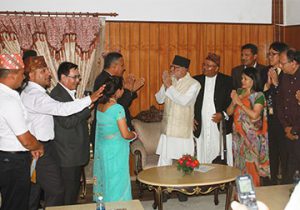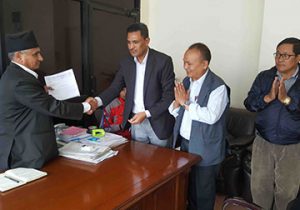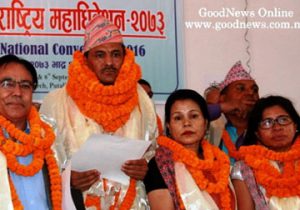Christian community in Nepal has older than four hundred years’ history. However, they have been deliberately marginalized from economic, social and cultural opportunities by unitary state mechanism, sent to custody, forcefully exiled and frequently attacked over their religious beliefs in charge of religion publicity. Specially, the Hindu hierarchical religious practice deprived Christian community of Nepal from their right to entertain religious practices and human right which put the Christian community in constant threat of right to live independently.
Nepali people, first time in the history of nation got opportunity to write their constitution in their direct participation through the successful election of Constitutional Assembly (CA) in 2007/8. The Interim Constitution of Nepal – 2009 legally recognizes inclusive principle ensuring representation people based on class, race, gender, religion and geography at all levels of state mechanism by declaring nation as democratic republic and religiously secular. To some extent, same principle was applied in the process of CA formation. Unfortunately, the representation of Christian community remained zero in historical CA house. The issues nation restructuring, right to self decision, identity, independence, secularism and multiculturalism have strongly been raised from every sectors of society to scientifically reconstruct the nation restructuring stereotypical unitary state mechanism.



FNCN is a first formal national wide nonprofit making umbrella organization committed and accountable for the promotion and protection of Church and other organizations. It was established in 2011 in the initiatives of Pastors from Christian community, leaders and human right activists, social workers on the foundation of provision envisaged by the Interim Constitution of Nepal – 2008 Nepal as a secular state. It has been quite committed and actively working to end religious injustice historically existed in Nepali society and practical implementation of secularism and social equity by being committed in the universal principles of democracy and human right along with taking initiation in the management of grave yard of Christian community from the day of its establishment.
FNCN aims to play an active role in the practical implementation of secularism in order to secure citizens’ right to religion, equality, human rights and so on. Likewise, to represent the Christian related issues in constitution and other laws, FNCN plays the role of mediator between government and communities. Moreover, it deals with the fundamental, cultural, economic rights of Nepali Christian communities in collaboration with many other related parties like government, Ngo/INGO, religious organizations and others. The major goal of Federation is to create a transparent and just democratic behavior institutionalizing goals and objectives adopted by various churches scattered across the nation and establishing the practices of right to expressions and information and the basic principles of human right and democracy.
Our strength and Experiences: So far the structure, network and reach of FNCN is concerned, it is guided by 151-member Executive Committee headed by C.B. Gahatraj. It has 7 province committes, 75 District Committee and other regional Committee in the in the regional levels have been formed under the federation whereas almost all the churches of nation have already got membership of the Federation. So far, Similarly, Federation is in the process to establishment non residential Contact Committee in the international arena.
FNCN has also gained significant expertise working with civil society, media organizations, religious organizations, political parties and Nepal government for practical implementation of Secularism and religious rights of Nepali Christian community. FNCN organized 40 days relay hunger strike. The relay hunger strike ended with the three point agreement with government of Nepal on May 1, 2011. Though the 3 point agreement was made, government remained passive for a long time. Seeing the passiveness of government, FNCN declared the movement program. Ultimately, on May 26, 2012 there was another historical 6 points agreement between FNCN and Nepal government to address the demands of Nepali Christian Community. In the like manner, FNCN organized different trainings and awareness programs at Local and National levels like: Kathmandu, Hetauda, Bara, Parsa, Rautahat, Rupandehi, Dang, Banke, Bardiya, Surkhet, Dailekh, Jhapa, Dolakha, Sindhupalchowk, which was another grand activity to unite Christians dwelling across the country.